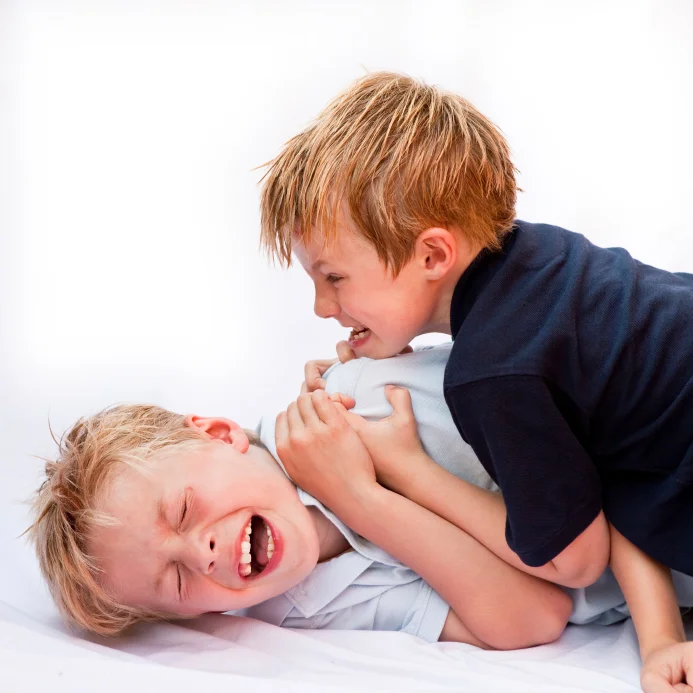Sibling fights getting you down?
Why do children fight?
It may drive you mad, but kids fight. It’s natural. They fight because they are bored, they want attention, they feel tired, jealous or angry and don’t know how to express it. You’re very unlikely to stop the squabbles completely, but learning how to resolve these conflicts can make all the difference both to your own stress levels and how your kids feel about each other and the world in general.
What to do when children fight
Stay well connected:
Anxiety is often the reason behind angry outbursts between siblings. Your child is fearful of losing your love and needs to be reminded that he’s special to you. Each day set aside some one-to-one time with each child – it doesn’t need to be a play activity and in fact, it’s better if it’s an ordinary everyday activity such as sorting laundry, writing the weekly shopping list, tidying the toys away together. Not only will you be fostering a sense of camaraderie but you’ll also find it easier to find the time to do it.
Encourage bonding:
Keep reinforcing the idea that your siblings love each other and get along well. Take photographs of them playing together, having fun and stick them into a small photo album to look at on a regular basis. Looking through photo albums can even take the place of a bedtime story. Encourage your children to tell the story of what was happening in the picture. Use words and phrases such as:
“I can see you’re sharing your toys today – that’s kind.” or “Playing together again. That’s good fun isn’t it?”
Sniff the baby:
This may seem like a weird tip, but if you’re worried about how your older sibling will respond to the arrival of a new born baby, encourage them to sniff baby’s head regularly. Researchers have discovered that new-born babies release pheromones from the top of their heads. Regular sniffing of this chemical release will calm down any aggressive instincts your child may have towards a new-born sibling and he’ll become more protective instead.
Play ‘kids versus parents’ games:
It’s common to see families divide themselves up into teams by spreading the children evenly between the adults to ‘balance’ things out, but this doesn’t help them form a strong unit. Choose different kinds of games that will suit their abilities. Children can chase parents round the garden, play hide and seek, or Twister, and not be disadvantaged.
Get down to your child’s level:
During an argument, anxiety levels will be high and an adult talking crossly from a great height will add to this feeling. Get down to your child’s level rather than standing and towering over them.
Go to the injured party first:
If there is an obviously injured party, go to them first and soothe them. This will ensure that the naughty one doesn’t get immediate attention for his poor behaviour. If you launch into a heated lecture, he will start learning that the best way to engage with an adult is to fight with his siblings. Do include the ‘naughty’ sibling in the soothing process though – they could perhaps fetch some sticking plasters, a cold flannel or a drink of water – rather than excluding them, which is not what they really need at this point.
Avoid taking sides and don’t insist on an apology:
Parents that ‘take sides’ only inflame the situation that in turn can lead to retaliations. Once you have calmed the situation down, don’t drag an apology out. Your children will be feeling unhappy, cross and angry and need help, support and guidance. Now is not the time to insist one or other of them says ‘sorry’. They feel confused and absolutely not sorry at all right at this precise moment. If you make a child apologise when they don’t genuinely feel it, you’ll be teaching them to lie.
One of the best ways to teach your child to say sorry is to lead by example and apologise for your own behaviour from time to time eg:
“I’m really sorry I got shirty with you guys when we were getting in the car the other day. It was just that I was worried we’d be really late for school. As it turned out, we were on time, so I needn’t have worried so much. I’ll remember that next time.”
Again, don’t force an apology out of your children. Simply demonstrate that this is part and parcel of normal family life. Little by little, they’ll get the message that it makes everyone feel better to say sorry.
Beware the self-fulfilling prophecy:
Avoid talking about your children as siblings who ‘always fight’ and ‘just can’t get along’. Too many of us greet our partners and other family members at the end of a busy day with ‘bad news’ and stories of fights and arguments. Save those stories for another time. When your children are in earshot, deliberately start talking about how their behaviour is improving and how much better they seem to be getting along these days. Even if your children are not in the same room as you, they’ll be listening and absorbing your every word. The sooner they can start to see themselves as siblings who get along, the sooner that’s what they’ll become.
Learn more about my children’s behaviour books, “First Aid for Your Child’s Mind” and “Words that Work – How to Get Kids to Do Almost Anything”.
About the Author
Alicia Eaton is a Harley Street based Psychotherapist and Clinical Hypnotherapist and the author of four best-selling books. She’s also a Winner in the latest ‘Global Health & Pharma’ Mental Health Awards 2023. For more details of appointments see here: Consultations.


